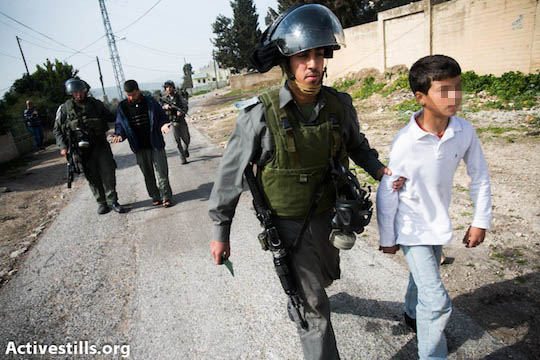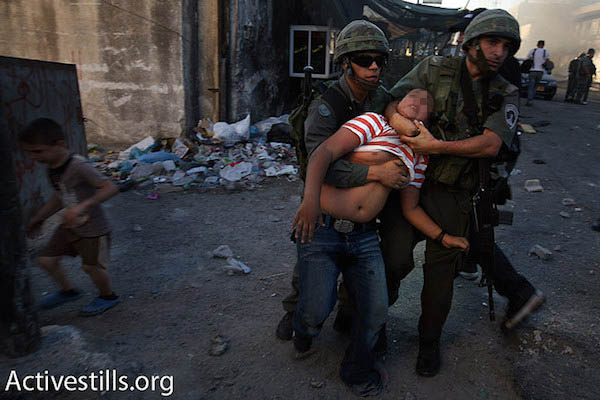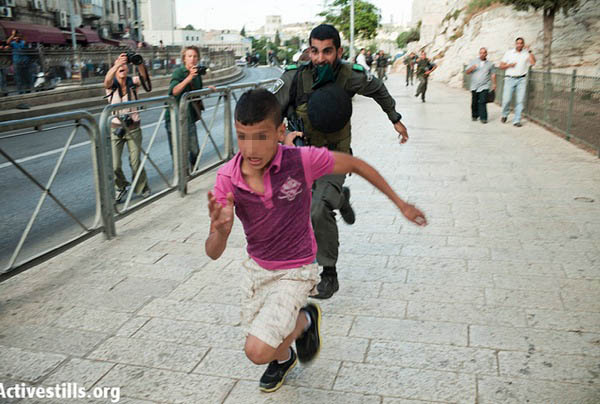In a reality where children aged 10 and 11 are arrested by 18- and 19-year-old soldiers who have been indoctrinated for military service since kindergarten, this kind of discussion seems completely out of place. A human rights attorney spends the day at one of the occupation’s more bizarre PR events.
By Smadar Ben-Natan

“Involvement of Children in Terrorism.” That was the rather confusing name given to a conference organized by the International Institute for Counter-Terrorism (ICT) at the Interdisciplinary Center Herzliya (IDC).
What is the context for discussing the involvement of children in terrorism? What is meant by the word “terrorism?” Are we supposed to be more afraid of these children? Are we to condemn terrorism for the moral corruption of conscripting children? Do we try and help those children trapped in its claws? Should we punish them severely or have mercy on them?
The confusion only grew in light of the fact that the conference marked the fifth anniversary of the establishment of the Israeli Juvenile Military Court in the West Bank. The fact that minors in the West Bank have been brought before military courts for nearly 50 years should have provoked shame and embarrassment. Instead, the establishment of this court is a source of great pride for the military court system in the occupied territories.
Read +972’s special coverage: Children Under Occupation
The session dedicated to the Juvenile Court served as yet another self-congratulatory event of the military court system. Its participants included President of the Military Court of Appeals Nathaniel Benisho, former president of the court Aharon Mishniot, president of the Israeli civil juvenile court system Galit Vigotzki-Mor and Deputy Attorney General Raz Nazari. The high-ranking members of the Israeli civilian legal system exemplified the extent to which the Israeli legal system is involved in the legislation of military law in the occupied territories — and in maintaining the occupation, including the facade of benevolence.
To avoid any doubt, trying minors in a juvenile military court is always preferable to trying them in regular military courts. However, both are terrible options that give us only the slightest glimpse into the unbearable life of children and teenagers in the occupied territories, which have been under a brutal military regime for nearly 50 years.
A pretense of distinction

But like its title, the conference did not deal with questions of juvenile justice; it dealt with the involvement of minors in terrorism. The opening lecture, delivered ICT founder and executive director Boaz Ganor, presented frightening videos showing children serving in the ranks of the Islamic State and the Nusra Front. Most of the discussion, however, dealt with Palestinian children in the West Bank and East Jerusalem, who are mostly involved in stone throwing and what is termed “disrupting public order.”
Ganor did make the distinction and said that not all stone throwing should be considered act of terror. Only actions instigated by a terrorist organization with the aim of achieving political goals count as terrorism, rather than spontaneous and independent actions. This, of course, is one central criterion. The important question that should have been at the center of the discussion, however, was immediately and intentionally overlooked throughout the rest of the discussion by all the speakers, who continued to discuss the violent protests in Jerusalem.
The cleverness of the conference’s title lies in the intersection between the problematic prosecution of minors in military and civilian courts alike — for offenses relating to the Palestinian struggle against the occupation — and the international discourse relating to child soldiers. The latter concerns the participation of children in any kind of hostilities, not only in terrorism, or in protest or resistance to oppression and occupation.
Culpability and exploitation
Evolving international policy regarding child soldiers does not distinguish between fighting in terror organizations and fighting in national armed forces. This policy seeks to keep children and youngsters from conscription into any armed activities, whether into taking a direct part in hostilities or indirectly supporting fighting forces, such as young girls who serve as wives or slaves for fighters — a phenomenon that has come to be known as “bush wives.” From that perspective, Israeli military boarding schools and pre-conscription preparations can be seen in a different light.
The fundamental rationale behind the prohibition against conscripting child soldiers is that these children are exploited, turned into victims, suffer acute psychological and social damage and cannot bear full responsibility for their actions as combatants. Moral judgment is not sufficiently developed at these ages (according to Judge Vigotzki Mor, 22 is the average age at which people are able to make sound moral judgments), and the dependence on adults facilitates the recruitment of youngsters into fighting and sometimes committing atrocities that would make most adults recoil. This combination of victim and abuser, embodied in the child soldier, makes the issue extremely complex.
The way in which the International Criminal Court (ICC) has chosen to deal with the issue is primarily by defining as a war crime the conscription of children under the age of 15 into national armed forces or actively participating in hostilities. Concurrently, the ICC’s authority only applies to people over the age of 18. In the Special Court established after the civil war in Sierra Leone — in which many child soldiers took part — the minimum age of criminal responsibility was set at 15. In reality, however, the court did not try teenagers under 18; instead, its efforts focused on adults who recruited those children.

Have such proposals been raised in the military court system? Apparently not.
In a reality where — although the minimum age for criminal culpability is 12 — children aged 10 and 11 are arrested by 18- and 19-year-old soldiers who have been indoctrinated for enlistment since kindergarten, this kind of discussion seems completely out of place. The UN Special Representative for Children and Armed Conflict presents troubling statistics regarding the situation in Israel and the West Bank, noting the large number of Palestinian children who are either killed, arrested, or suffer from inhumane and humiliating treatment. She further notes the worrying number of Israeli Jewish children who have been wounded, and IDF activities that are directed at or take place near schools.
Speaking about child soldiers and children’s’ involvement in terrorism sounds better than the oft-heard talk about heavy handed law enforcement against children who throw stones or disrupt public order. The total misunderstanding of these categories assists in creating this confusion.
Make no mistake, what troubles the International Institute for Counter-Terrorism and Israeli military commanders in the occupied territories is not the unbearable living conditions of children in the West Bank, East Jerusalem or the Gaza Strip, or even Sderot — living conditions that could lead to exploitation and cruelty. This is just another PR campaign for the fight against terror and the benevolent occupation, waged on the backs of children whom no one cares about.
Smadar Ben-Natan is a human rights and criminal lawyer, a doctoral student in the law faculty of Tel Aviv University, and researches Israeli military courts. A version of this article was also published on +972’s Hebrew-language sister site, Local Call. Read it here.
Read also:
Detained: Testimonies from Palestinian children imprisoned by Israel
A pretense of progress for children in Israel’s military courts
Palestinian kids detail abusive interrogations, arrests
